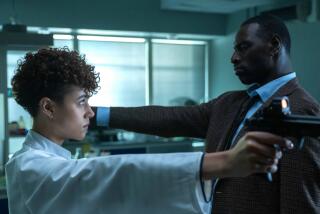Getting a Kick Out of Emotion
- Share via
Hong Kong, a region with a population of a mere 6.7 million, has produced one of the world’s most influential film industries, especially when it comes to action. And much credit for that kinetic genre, the Hong Kong action film, goes to one man: Tsui Hark.
Over the last two decades, he has directed or produced 50 feature films, including some of the classics of the genre.
For a while, he exhibited the Midas touch: Everything with which he was involved turned to box-office gold. He directed “Zu: Warriors From the Magic Mountain” (1983), “Peking Opera Blues” (1986), “Swordsman” (1990) and “Once Upon a Time in China” (1991), the first of a series that launched the career of Jet Li. More recently, Tsui ventured West and directed two Jean-Claude Van Damme films, “Double Team” (1997) and “Knock Off” (1998), not considered among his most memorable works.
These days he is back home, working in the looser, more freewheeling style he seems to prefer.
“In Hong Kong, you get into production right away,” Tsui, 50, said during a visit to Los Angeles. A striking-looking man with a tumble of graying black hair, broad-set cheekbones and a goatee, he projects the tirelessness for which he is famous on the set. “During the production, they’re very flexible; they provide you what you want. Hong Kong is like a very small town, and we make use of each other’s best.”
Though he is not as well known in the United States as John Woo, another key founder of the genre and a former collaborator, his visibility is on the rise.
Today he marks the first-ever U.S. commercial release of one of his Chinese-language films, “Time and Tide,” a gangland action thriller made in Hong Kong and China. It was financed by Hong Kong-based Columbia Pictures Film Production Asia and designed solely for the Asian market, where Tsui Hark films have the cachet of Steven Spielberg films here.
Now that it has done so well in Asia--and now that “Crouching Tiger, Hidden Dragon” has done so well in the U.S.--Columbia TriStar is releasing it here, in Chinese with English subtitles.
The tale begins with hoodlum-hipster Tyler (Nicholas Tse) retelling the biblical story of Genesis, by way of Hong Kong Darwinism. “Let there be light” is illustrated by a fancy cigarette lighter going off, “survival of the fittest” by a woman kicking a man.
This round of cynicism is later tempered by the acts of kindness and heroism that mark Tsui’s quirky blend of sentimentality and hard-boiled action. Bullets and bodies may fall like hail, but somewhere amid the muck and mire is a gangster with a heart of gold.
Tsui is not shy about being commercial. His films are deliberate crowd pleasers. He likes to deliver the sentiments expected as well as “something not seen before.” And for box-office insurance, he often casts au courant pop singers, television personalities and models.
For his current film, Tsui recruited Tse, a hot young Hong Kong singer, former model Cathy Chiu and Wu Bai, a rock star from Taiwan.
Born in China, Tsui was raised in Vietnam and Hong Kong. In the mid-1960s he came to the United States for college. Two years after getting a degree from the University of Texas in 1970, he moved to New York, where he edited a Chinese newspaper, helped develop community theater and worked on cable projects.
Five years later he returned to Hong Kong and got a job in television, eventually directing a romantic action series called “Gold Dagger,” which impressed everyone for bringing a film look to a video production. In those days, he knew nothing about action movies other than that he was a fan.
His first film, “Butterfly Murders,” was a flop, but he kept on and, after directing half a dozen movies for others, he decided to set up his own company. In 1984, he founded Film Workshop with his wife, Nansun Shih.
As a producer, he oversaw many films that gave a number of people their launching pad. Action choreographer Ching Siu-tung was given a chance to direct the thriller, “A Chinese Ghost Story” (1987). And Woo made “A Better Tomorrow” (1986) and “The Killer” (1989), both starring Chow Yun-fat, for Film Workshop.
After creative disputes over the making of “The Killer,” Tsui and Woo parted company, with Woo moving across the Pacific Ocean to remake his career in Hollywood.
Tsui sees his artistic vision developing in stages. “Well, first I was just concerned about being a good director,” he says. “To shoot a story in a very creative way, that was the first thing. In the second stage, I was more into controlling the material.”
Tsui has also been responsible for writing a lot of his films. “Then I realized that even if you controlled the material,” he says, “it doesn’t make the phenomenon. So eventually I realized that the most important thing is to have emotional interaction with the audience, so I had films like ‘Shanghai Blues,’ ‘Peking Opera Blues’ and ‘A Better Tomorrow.’ ”
He believes that the romantic touch--whether a boy longing for a girl or a brother willing to die for a brother--is what sets him apart and makes audiences flock to his films.
Americans will be seeing more of Tsui. Miramax has acquired his martial arts extravaganza “The Legend of Zu,” due out this summer in Hong Kong, and Columbia TriStar bought the rights to the action thriller “Black Mask 2: City of Masks,” a sequel to the 1996 hit “The Black Mask” (a film he executive-produced but did not direct).
More to Read
Only good movies
Get the Indie Focus newsletter, Mark Olsen's weekly guide to the world of cinema.
You may occasionally receive promotional content from the Los Angeles Times.










